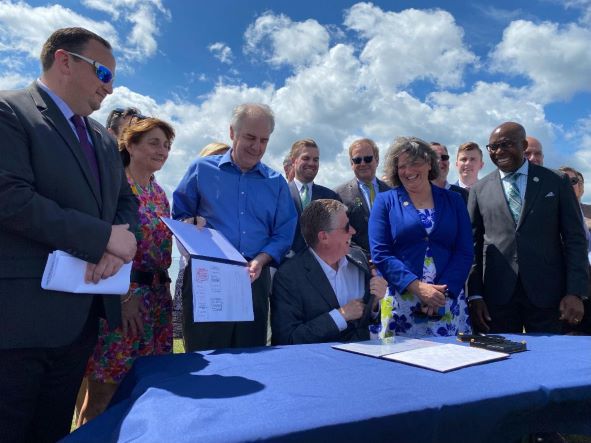Governor McKee Signs Legislation Requiring Offshore Wind Procurement for 600 to 1,000 Megawatts

NORTH KINGSTOWN, RI – Continuing his #RIMomentum Tour, Governor Dan McKee today signed into law historic legislation proposed by his Administration that seeks to expand Rhode Island’s offshore wind energy resources. The new law requires a market-competitive procurement for between 600 and 1,000 MW of newly-developed offshore wind capacity. Rhode Island’s primary utility company, Rhode Island Energy, is required to issue the procurement no later than Oct. 15, 2022.
“Offshore wind is one of our state’s most abundant natural resources,” said Governor McKee. “Adding offshore wind clean energy capacity is essential for meeting our new 100 percent renewable energy by 2033 goal and our Act on Climate emissions reductions target. It will not only be beneficial for the environment, but also create hundreds of jobs as we position Rhode Island as an economic hub of this growing offshore wind industry on the Atlantic Coast.”
“Already home to the first offshore wind farm in the country, this procurement establishes Rhode Island as a leader in the blue and green economies,” said Lt. Governor Sabina Matos. “This procurement has the potential to power 340,000 homes each year and will create hundreds of well-paying jobs. Our goal to achieve 100 percent renewable energy by 2033 is the most ambitious in the country but projects like this will ensure we get there.”
“When we enacted the Act on Climate last year, Rhode Island made a historically firm, enforceable commitment to rapidly adopt renewable energy and get serious about our climate obligations. Projects like the one we’re seeking with this legislation are an important part of our energy future. I’m glad to see the level of support there is for a major project like this one, because it will be a major step toward responsibly developed renewable energy in Rhode Island,” said bill sponsor Sen. Dawn Euer (D-Dist. 13, Newport, Jamestown), who also sponsored the Act on Climate.
“There are so many reasons Rhode Island should be moving boldly in developing offshore wind and other renewables. We know from the Block Island Wind Farm that offshore wind works well here, and benefits our ratepayers. As the Ocean State, we are experiencing the negative effects of rising seas, so we need to do our share to move away from carbon fuels. Producing our own green energy is vastly more beneficial to our own economy than relying on fossil fuels that are often shipped from other areas of the world, which can also be subject to price volatility, as we are seeing right now. We will make great strides toward carbon neutrality with this policy, and I’m excited to see it move forward,” said bill sponsor Rep. Arthur Handy (D-Dist. 18, Cranston).
“Offshore wind is a vital domestic and scalable clean energy resource for Rhode Island and the nation,” said State Energy Commissioner Nicholas S. Ucci. “Rhode Island’s next large scale offshore wind procurement creates the potential to attract competitively-priced electricity for consumers, and investment and job opportunities for our economy. This legislation is another important step for the Ocean State as we look to achieve our Act on Climate goals.”
The RFP calls for an additional 600 to 1,000 MW of offshore wind which has the potential to meet at least 30 percent of Rhode Island’s estimated 2030 electricity demand. This electricity from the project has the potential to power about 340,000 homes each year. When added to the 30 MW Block Island Wind farm and the planned 400 MW Revolution Wind project, about half of the state’s project energy needs will be powered by offshore wind.
Rhode Island Energy, the state’s primary utility, is required to solicit bids for 600 to 1,000 MW of new offshore wind capacity. The bill will allow the Public Utilities Commission to decide whether the utility will receive a renumeration payment of up to 1 percent of the contract amount. This incentive allowance will expire at the end of 2026.
Three agencies will review any proposed offshore wind contract and provide advisory opinions: the Office of Energy Resources, the Department of Environmental Management, and Rhode Island Commerce. The Public Utilities Commission will review any contracts that result from this RFP and issue a ruling.